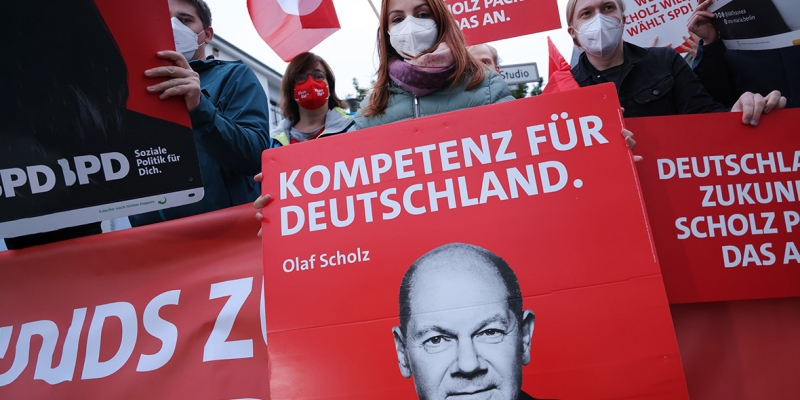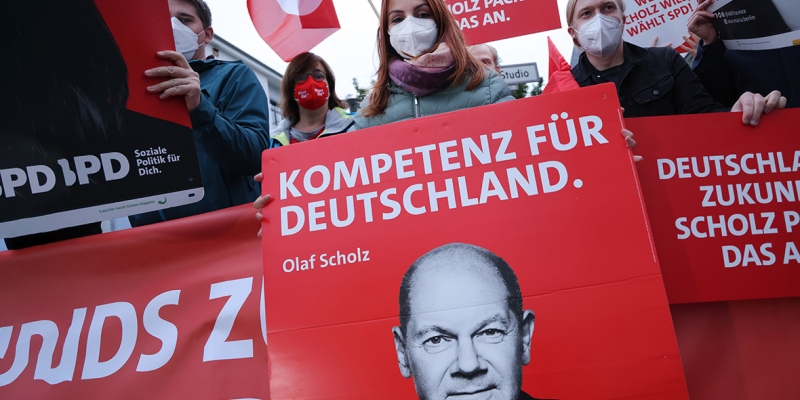Inthe first ruling coalition in Germany will consist of three participants – according to the agreement on the creation of a new government, it will be headed by Social Democrat Olaf Scholz, the “Greens” and free Democrats will receive ministerial portfolios

The Social Democratic Party of Germany (SPD), the Greens and the Free Democratic Party of Germany (FDP) on Wednesday, November 24, presented in Berlin a coalition agreement on the creation of a new government with SPD leader Olaf Scholz at the head. This coalition in Germany was named “traffic light”, according to the colors of the participating parties.
“The traffic light has started working,” Scholz said, noting that the three parties are united by the desire to make the country better (the broadcast of the speech was conducted on the website of Der Spiegel magazine). “The goal of the traffic light is not the search for the lowest common denominator, but the policy of big actions,” the future chancellor stressed. In addition to him, the SPD co-chairs Zaskia Esken and Norbert Walter-Borjans, the leaders of the Greens Annalena Berbock and Robert Habek, as well as the chairman of the FDP Christian Linder were on the stage.
The 177-page document presented by them on Wednesday was the result of negotiations between 22 working groups, which for a month and a half have been trying to bring the positions of the three political forces closer together on key issues of the internal and external agenda.
The agreement must first be approved by each of the parties, which, according to Scholz, will take ten days. This period is explained by the specifics of the procedure. If the SPD and the FDP plan to approve the agreement at the party congresses on December 4 and 5, then the Greens will need to conduct a voting procedure within the party.
According to Der Spiegel, Scholz can be sworn in as the new Chancellor of Germany until December 8, but not before the 6th.
According to the results of the parliamentary elections held in Germany on September 26, the SPD led by Vice Chancellor, Finance Minister Olaf Scholz was in first place with a result of 25.7%. The Christian Democratic Union (CDU), which was headed by Angela Merkel for many years, became the second, showing the worst result in history – 24.1% (The Christian Social Union (CSU), with which the CDU goes as a single bloc to the Bundestag, also showed its worst result in Bavaria).The Greens came third with 14.8%, followed by the FDP with 11.5%, the Alternative for Germany (ADG) with 10.3% and the Left with 4.9%. A few days later, the Social Democrats, the Greens and the Free Democrats announced their intention to create a ruling coalition, Traffic Light. For Germany, such a triple alliance will become a precedent. Before that, two parties traditionally stood at the head of the country.
Who will occupy key ministerial posts
According to Der Spiegel, the parties distributed ministerial posts as follows: the SPD got six portfolios, the Greens got five, the FDP got four. The distribution of ministerial portfolios largely copies the system that has developed during the country’s governance by the CDU/CSU and SPD alliance under Angela Merkel.
The Social Democrats, as the leading party, will be given the posts of Minister of Defense, Interior and Health. «Green» as number two— the Ministry of Foreign Affairs, which will be headed by Annalena Berbock. The second co-chairman of the party, Robert Habek, will head the new Ministry of Climate and Economic Affairs. The Greens insisted on its creation. Presumably, it is Habek who will become vice-chancellor. This is indirectly evidenced by the fact that during the press conference Habekrepresented the priorities of the party in the new coalition. Since, according to German law, there cannot be two vice-chancellors in the government, this position will go to the Greens as the second largest political force in the new coalition. The FDP will leave the Ministries of Justice and Finance. It is expected that Christian Linder will head the Ministry of Finance. He called the receipt of this portfolio one of the main conditions for the entry of the FDP into the government.
What is said in the coalition agreement
According to the document (the coalition agreement is at the disposal of RBC), the three parties agreed on the following provisions of domestic and foreign policy.
- To maintain a constructive dialogue with Russia, because bilateral relations between the countries are “deep and diverse,” and Russia is an important international player.
- To help Ukraine in restoring its territorial integrity and demand an end to the illegal annexation of Crimea.
- To increase the sanctions pressure on the President of Belarus Alexander Lukashenko and support the opposition in this country.
- Grant the Ministry of Defense the right to use drones.
- By 2030, Germany should receive 80% of its electricity from renewable sources (previously, the benchmark was 65%).
- Due to high energy prices, charges for CO2 emissions will not increase for fuel, fuel oil and gas.
- The minimum wage in Germany will increase to €12 per hour.
- The controlled distribution of cannabis among adults in licensed stores will be introduced to facilitate the control of its quality and the protection of minors.
- The Law on Transsexuals, which defines the rules of transgender transition, will be replaced by the law on self-determination.
- The term “race” will be excluded from the German Constitution, the third article will be supplemented with a provision prohibiting discrimination based on gender.
How will the new government deal with the pandemic
Before the announcement of the main agreements reached by the parties, Scholz presented new measures to combat coronavirus, which the future government intends to introduce in the country. “The situation is serious, the participants of the traffic light have agreed to take decisive steps to contain the pandemic. They must be carried out consistently,” he said. According to him, the new government intends to createpermanent anti-crisis headquarters at the Chancellor’s office in Berlin. However, this decision will need to be approved. Also, the three parties advocate the introduction of mandatory vaccination for workers in certain areas, primarily those who work with people at risk. In the future, this measure may be expanded. “Vaccination is the way out of the pandemic,” the future chancellor stressed.
Scholz also announced new payments to medical workers, who, according to him, bore the brunt of the fight against the pandemic. €1 billion will be allocated for this. Scholz expressed confidence that Germany will be able to defeat the fourth wave of coronavirus. “The new federal government will do everything necessary for our country to safely survive this time,” he stressed.
Subscribe to YouTube RBC Live broadcasts, videos and recordings of broadcasts on our YouTube channel

